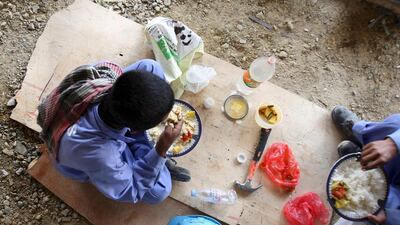DUBAI // The midday break for outdoor construction workers ensured a fall in the number of men admitted for emergency heat-exhaustion treatment this summer, a doctor said.
Dehydration and heat stroke is a constant danger for the thousands of labourers across the country who work on projects in temperatures that top 40°C.
The Ministry of Labour rule stipulates that businesses must not allow workers to operate outdoors between 12pm and 3.30pm during the hottest three months of the year, to protect them from the effects of heat stroke. The rule is now in its 11th year. This year’s heat-of-the-day break came to an end on Tuesday.
The ruling was declared a success by Dubai Health Authority, which said medical staff had treated fewer people for the debilitating symptoms related to heat stress during the three-month period.
Maher El Hamarna, head of the medical unit at Dubai Hospital’s emergency department, said: “The midday rule and its effective implementation, as well as an increase in awareness about heat-related illnesses among all strata of the population, are positive factors that have led to a significant decline in the number of cases we receive.”
Inspection patrols from the Permanent Committee of Labour Affairs began daily checks on work sites to ensure compliance with the midday break from June 13, two days before its implementation.
Those found breaking the law were hit with a Dh10,000 fine and had their companies downgraded to category C for at least three months, making them ineligible for work permits for at least six months.
Those caught out a second time had no work permits processed for nine months and faced fines of Dh15,000, while third-time offenders were fined Dh20,000 and not issued work permits for a year.
Employers were told to prove compliance by posting daily notices of work timings at a visible spot on sites for inspectors to view.
Vinod, from India, who worked on outdoor projects in Ajman this summer, said he and many of his colleagues had gradually acclimatised to the intense heat.
“Yes, it is hot but we are all used to it,” he said. “We travel early in the morning when it is slightly cooler but it is tougher during the afternoon. We know we must drink plenty of water.”
The Ministry of Labour also said that daily working hours must not exceed eight hours in the morning or night shift, and overtime should be paid to those working additional hours, as stated by the Federal Law No 8 of 1980 on Labour Affairs.
The vast majority of companies inspected in relation to midday break regulations were found to be following the rules.
To promote awareness, thousands of educational visits took place at labour camps and sites across the country in June, and more than 10,000 leaflets in 10 languages were distributed.
In Abu Dhabi there were about 1,525 labour educational field visits and 931 in Al Ain. Dubai sites had 741 visits; Sharjah 538; and 360 in Ajman. A further 888 visits took place in Ras Al Khaimah, with 631 in Umm Al Quwain and 330 in Fujairah.
Heat-related illnesses can be caused by exertion or non-exertion. Non-exertional heat illnesses are more common among very young children, the elderly, patients with chronic illnesses and those on psychiatric medications.
Prof Dr Elham El Zaher, a consultant in dermatology and venereology at Burjeel Hospital, in Abu Dhabi, offered advice on how people can continue to stay healthy in the heat.
“Dehydration can happen suddenly, especially with old people and children, but also after heavy exercise,” he said. “Heat stroke is a very serious condition characterised by high body temperature, confusion, short, rapid breathing, sweating and fast pulse. In the case of heat stroke, the person needs to call emergency services.”
When outdoors, he advised people to drink a lot of fluids, especially water, to stay hydrated and to avoid being exposed to the sun between 10am and 4pm without sunscreen.
nwebster@thenational.ae


